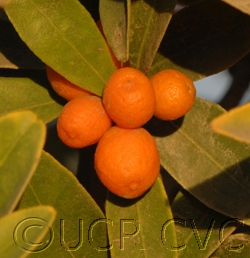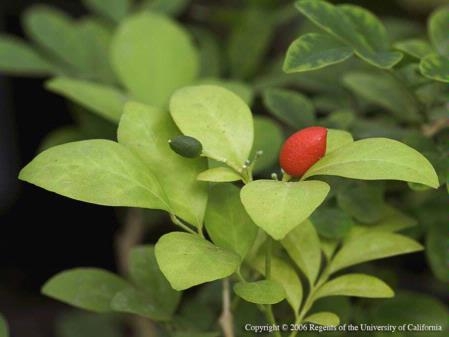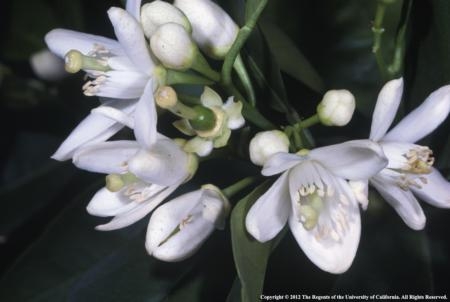- Author: Cris L. Johnson

The "Citrus Production Manual" covers the step-by-step process for preparing citrus for production and includes information on diseases and other issues that can affect citrus.
According to the ANR catalog website the manual will assist growers "From deciding scion variety and rootstock, to establishing an orchard, to managing production, to postharvest handling, you'll find it all here in a readable format. Colorful photos and clear diagrams and illustrations guide you through important concepts."
The manual costs $75 and you can order this publication click on the following link.
http://anrcatalog.ucdavis.edu/Details.aspx?itemNo=3539
Or you can save 25% by bundling the "Citrus Production Manual" with the 3rd edition of "IPM for Citrus" for a cost of only $10 more ($85 for both!). Order the bundle by clicking on the following link.
http://anrcatalog.ucdavis.edu/Details.aspx?itemNo=3539PROMO
SAVE 10% when you order this manual using the promo code "PREVEN56." This code extends the discount to you and provides a portion of the sale to UC Cooperative Extension Ventura which goes toward maintaining our local programs here.
- Author: Cris L. Johnson

Articles in the November-December, 2013 issue include:
Rehabilitating Frost Damaged Citrus and Avocado - Although we live in sunny southern California the area has been subject to winter freezes. This article by UCCE Ventura advisor Dr. Ben Faber gives advice on ways to mitigate the damage caused by frost.
Advances in mitigation of alternate bearing of olive: vegetative growth response to plant growth regulators - UCCE Tulare advisor Dr. Elizabeth Fichtner and UC Riverside professor Carol Lovatt contributed this article on the results of their studies on the relationship between fruit load and vegetative growth on 'Manzanillo' olives.
Fertigation - Measuring Uniformity - Dr. Larry Schwankl, a UC Davis irrigation specialist, discusses steps to uniformly apply fertilizers. Fertigation is the injection of fertilizers through the irrigation system.
Olive Fly Update - UC Davis professor, Dr. Frank Zalom and UC Berkeley professor Dr. Bob VanSteenwyk provides a article on olive fly monitoring and treatment.
Read the full articles from this newsletter or check out other issues of Topics in Subtropics here.
Articles in the Winter 2014 drought issue include:
The Spanish Avocado Industry - Dr. Ben Faber, UCCE Ventura advisor, reports on the avocado production and issues in Spain which has similar amounts of acreage devoted to avocado as California. He discusses his observations on varieties, productions and diseases and pests that affect these trees.
Strategizing for Water Cutbacks - Avocado and Citrus - Dr. Faber also contributed this article for saving water, important in these drought stricken times.
California Agricultural Production Statistics - A short summary of statistics on the top California agricultural commodities for 2012 and other pertininent data including additional resources are presented here.
Maintaining the Citrus Orchard with a Reduced Irrigation Allotment - UCCE Kern County advisor, Craig Kallsen, also contributed more information on reducing water usage and still maintain an orchard.
The 2014 Drought in California - This article by UCCE Riverside County Director and advisor Etaferahu Takele summarizes some of the federal, state and UC resources for dealing with drought.
Read the full articles from this newsletter or check out other issues of Topics in Subtropics here.
- Author: Cris L. Johnson

The latest issue has recently been posted on our website and features articles on:
Cultural Practices to Reduce Pest and Disease in Avocado and Citrus. This article by UC Ventura County Cooperative Extension advisor Dr. Ben Faber provides guidelines for practices from selection to maintenance that can mitigate disease and pests in trees.
Polyphagous Shot Hole Borer in California. UC Cooperative Extension cross-county advisor Dr. Sabrina Drill discusses this pest and it's effects on Southern Californian trees.
Electronic "sniffer" for Detecting HLB. Dr. Faber also reports on a new device that can detect Huanglongbing (HBL) disease in trees. Learn more about how it works and the advantage it could provide in preventing HLB spread through early detection.
Important Information Sources Related to Fire Management and Protection. The fire season is still on us and this list of online and publshed resources provides useful information for property owners.
Bee Kill in Oregon - A reminder of pesticide use. The State of Oregon has issued a moratorium on an aphid control pesticide after its use killed a large amount of bumble bees. Read more about following the proper guidelines on pesticide use here.
Read the full articles from this newsletter or check out other issues of Topics in Subtropics here.
- Author: Chris M. Webb
Asian citrus psyllid, has not recently received much attention in the news media. However the pest, and the deadly bacterial disease it can carry, are still of great concern.
The Asian citrus psyllid (ACP) has now been found in eight California counties. Quarantines are in place. The psyllid by itself is not much of a problem; it is its ability to spread the fatal disease that has the potential to devastate both the California citrus industry and backyard citrus throughout the state.
Huanglongbing (HLB) is the name of the disease ACP can carry. Citrus and closely related plants are at risk. The disease is transmitted between plants by the psyllid. The psyllids transmit the disease to healthy plants and trees. After feeding on an infected plant, the ACP will transmit HLB to every other plant it feeds on.
While much outreach has focused on citrus trees, it is important to remember there are other plants that can host both ACP and HLB. This list from the University of Florida provides both the common and Latin plant name for many known hosts. Hosts include: curry leaf, ornamental orange-jasmine, and all the varieties of citrus, including kumquat, mandarin, grapefruit, orange and all of their hybrids.
Please remember to check your citrus and closely related plants regularly for signs of ACP or HLB. General information about this pest disease complex can be found on this section of the CDFA website. For local updates, the Ventura County ACP Task Force is a great source of information.
- Author: Chris M. Webb
The 2012 California Citrus Conference will be held October 10-12 in Porterville. This event is organized by the Citrus Research Board (CRB) and will include presentations, demos, and exhibitors.
Topics will include:
- ACP/HLB
- Pests
- Diseases
- Organics
- Irrigation
- Nutrition
Demonstrations and displays will include:
- ACP tracking and mapping
- Spray demonstrations
- Irrigation technologies
- Sensory evaluation lab
For more information please call the CRB at 559.738.0246 or email them.





